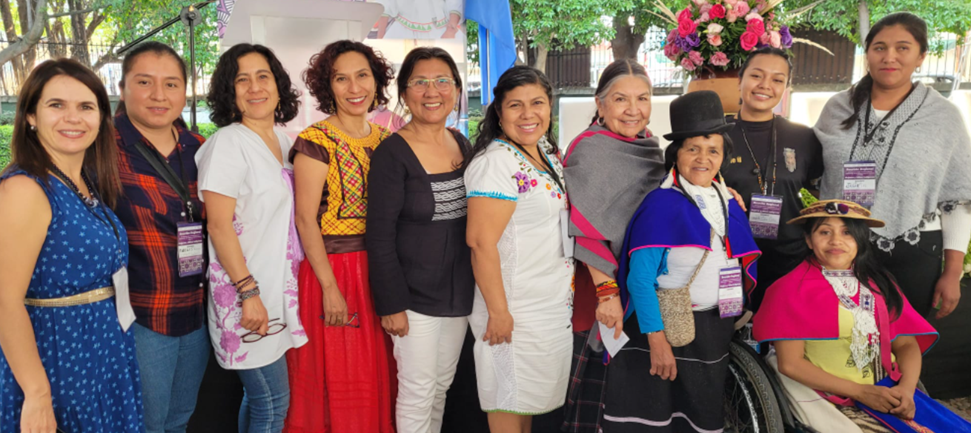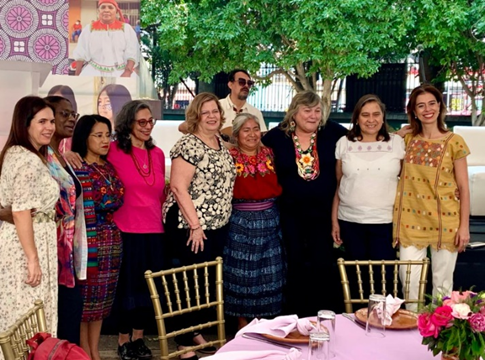Indigenous women leaders from across the region gather in Mexico to contribute to the development of the CEDAW General Recommendation on the Rights of Indigenous Women and Girls
Date:
Fifty-eight indigenous women from 21 countries (Argentina, Belize, Bolivia, Brazil, Chile, Colombia, Costa Rica, Ecuador, El Salvador, Guatemala, English Guyana, Honduras, Mexico, Nicaragua, Panama, Paraguay, Peru, Puerto Rico, Uruguay, and Venezuela) from 33 different indigenous peoples participated in the Regional Consultation on the upcoming General Recommendation No. 39 of the Convention on the Elimination of All Forms of Discrimination against Women (CEDAW) on the Rights of Indigenous Women and Girls. The Consultation took place in Tlaxcala, Mexico, on May 19-20, 2022, under the organization of the National Institute of Women of Mexico (INMUJERES), UN Women, the Office of the United Nations High Commissioner for Human Rights (OHCHR), the Committee of Experts of the Committee on the Elimination of All Forms of Discrimination against Women (CEDAW Committee), the International Indigenous Women's Forum (FIMI) and UNICEF.
The General Recommendation will guide CEDAW States Parties in implementing concrete measures to eliminate historical discrimination and the violation of the rights of indigenous women, considering their individual and collective rights. It will also reaffirm the fundamental role indigenous women played in preserving their culture, languages, and traditions. It will recognize indigenous women's leadership and capacity for action in protecting the environment and biodiversity and in the fight against climate change.
As part of CEDAW, General Recommendation No. 39 will be the first binding instrument focused on the rights of indigenous women and girls and responds to a long-standing demand by indigenous women themselves for a specific instrument to promote and protect their rights. Historically, indigenous women have persistently suffered from compounded discrimination and inequality based on gender and ethnicity, resulting in increased levels of poverty and violence, limited access to social services, and underrepresentation in decision-making. The COVID-19 pandemic has disproportionately impacted Indigenous women and girls.
Gladys Acosta, Chair of the CEDAW Committee, stressed that General Recommendation No. 39 emanates from indigenous women's history of struggle and advocacy. It requires State Parties to undertake every effort to comply with the international obligation to prohibit all forms of discrimination against women in all constituent aspects of CEDAW. "It is impossible to defend the human rights of indigenous women without a profound self-education process that generates human empathy with the indigenous world," she said.
Nadine Gasman, President of the National Women's Institute of Mexico (INMUJERES), welcomed the indigenous women to the Consultation. She stressed that "for us at INMUJERES, hosting this Regional Consultation is a sign of coherence with our work, with the Mexican Government's recognition of indigenous peoples and indigenous women. The Recommendation will represent a milestone that commits governments to promote and protect the rights of indigenous women."
The indigenous women participants recognized the importance of this Consultation, emphasizing that their individual and collective rights are interconnected because when a violation of individual women's rights occurs, the impact affects all indigenous peoples. Indistinctly, when indigenous territories are violated, the individual rights of indigenous women and girls are at risk. This interconnectivity should be reflected in the General Recommendation from an intersectional perspective.

They also emphasized that older women play a role in the indigenous community, considering that the relationship between them and the new generations is fundamental to guarantee the survival of their ancestral practices, knowledge, language, and culture. Furthermore, indigenous territories are not only a collective economic asset for indigenous peoples. It is the place where the ashes of their ancestors rest and where their cosmovision, forms of organization, languages, practices, and traditional knowledge come to life. All these aspects that define the identity and culture of indigenous women must be fully assumed and reflected in the final text to be submitted to the CEDAW Committee for adoption by the States Parties.
"The fundamental role played by indigenous women in environmental protection and climate change action must be recognized, and the lives of indigenous women human rights defenders must be protected. States must guarantee the right of indigenous women to participate in decision-making in all areas and sectors, including in their communities. They must create electoral districts for indigenous peoples, recognize the rights of indigenous peoples to their traditional forms of organization, and select their representatives according to their nomination processes." Betty Pérez, from the National Council of Indigenous Coordination of El Salvador.
UN Women has strongly supported this historical process. Indigenous women's agency and leadership strengthen movements and efforts for gender equality. "Our commitment is to continue to work with our indigenous sisters to ensure that the outcome of this Consultation is reflected in the text of the Recommendation that the CEDAW Committee will present to States Parties. Once adopted, we will contribute to the wide dissemination of General Recommendation No. 39. Together we will ensure that the General Recommendation becomes a strong advocacy and accountability tool that positively transforms the reality of indigenous women and girls worldwide," said Belén Sanz, UN Women Representative in Mexico.

María Noel Vaeza, UN Women's Regional Director for the Americas and the Caribbean, participated in the closing ceremony highlighting the importance of the process. "Let me reaffirm UN Women's commitment to this process, in which we have been present from the beginning and the indigenous women of the region. Together we will advance the effective implementation of this General Recommendation to make the principles of CEDAW a reality and ensure that de jure equality is also de facto equality in the lives of indigenous women and girls in the region and around the world," she said.
Tarcila Rivera, President of the International Indigenous Women's Forum (FIMI), concluded the ceremony by highlighting the fundamental role played by indigenous women in the survival of our world and its diversities. "When we talk about seeds, we talk about the world's food security. General Recommendation No. 39 must recognize the historical role indigenous women have played in protecting the environment. We demand recognition and concrete action by States. We will continue to be part of the consultation process until October, when the Committee will consider the adoption of General Recommendation No. 39. After that, our organizations will continue to join forces with stakeholders, including international organizations, to develop strategies and ensure its full implementation so that no indigenous women and no indigenous peoples are left behind."